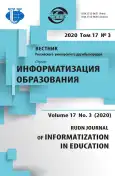Искусственный интеллект как компонент инновационного содержания общего образования: анализ мирового опыта и отечественные перспективы
- Авторы: Садыкова А.Р.1, Левченко И.В.1
-
Учреждения:
- Московский городской педагогический университет
- Выпуск: Том 17, № 3 (2020)
- Страницы: 201-209
- Раздел: ПРЕПОДАВАНИЕ ИНФОРМАТИКИ
- URL: https://journal-vniispk.ru/2312-8631/article/view/321248
- DOI: https://doi.org/10.22363/2312-8631-2020-17-3-201-209
- ID: 321248
Цитировать
Полный текст
Аннотация
Проблема и цель. Рассматривается мировой опыт внедрения искусственного интеллекта в систему образования школьников. Целью описываемого исследования является выявление особенностей рассмотрения искусственного интеллекта как компонента содержания образовательных систем в отдельных странах мира и возможных подходов к обучению основам искусственного интеллекта в российских школах. Методология. В процессе исследования был использован комплекс методов, таких как анализ информационных ресурсов и нормативных документов, обобщение и систематизация профессионально-педагогического опыта, рефлексия содержания сформированных знаний. Результаты. Выявлены особенности включения искусственного интеллекта в образовательные системы отдельных стран мира и обозначены различия в подходах к процессу обучения элементам искусственного интеллекта на содержательном и организационно-методическом уровнях. Результаты исследования позволили найти подходы к обучению учащихся российских школ основам искусственного интеллекта. Заключение. Показано, что вопрос включения искусственного интеллекта в образовательные системы различных государств находится в стадии разработки и проектирования, основанных на различных подходах. Выявлено, что сегодня искусственный интеллект чаще всего рассматривается как средство обучения школьников, а не как объект их изучения. Результаты проведенного исследования позволили предложить подходы к обучению основам искусственного интеллекта в общеобразовательной школе, реализация которых дают возможность адаптировать содержание учебного материала к возрастным особенностям школьников, определить системообразующие знания и умения, а также повысить эффективность профессиональной деятельности учителя информатики общеобразовательной школы.
Об авторах
Альбина Рифовна Садыкова
Московский городской педагогический университет
Автор, ответственный за переписку.
Email: albsad2008@yandex.ru
доктор педагогических наук, профессор кафедры информатики и прикладной математики
Российская Федерация, 127521, Москва, ул. Шереметьевская, 29Ирина Витальевна Левченко
Московский городской педагогический университет
Email: ira-lev@yandex.ru
доктор педагогических наук, профессор, профессор кафедры информатики и прикладной математики
Российская Федерация, 127521, Москва, ул. Шереметьевская, 29Список литературы
- Levchenko IV. Formirovanie invariantnogo soderzhaniya shkol'nogo kursa informatiki kak ehlementa fundamental'noj metodicheskoj podgotovki uchitelej informatiki [Formation of the invariant maintenance of the school course of computer science as element of fundamental methodical preparation of teachers of computer science]. Bulletin of People’s Friendship University of Russia. Series: Informatization of Education. 2009;(3):61–64.
- Nacionalnaya strategiya razvitiya iskusstvennogo intellekta v Rossii na period do 2030 goda [National Strategy for the Development of Artificial Intelligence in Russia until 2030]: Decree of the President of the Russian Federation of 10 October 2019 No. 490. Available from: http://www.consultant.ru/document/cons_doc_LAW_335184 (accessed: 30.03.2020).
- K-12 Computer Science Framework. Available from: http://www.k12cs.org (accessed: 30.03.2020).
- Murphy RF. Artificial Intelligence Applications to Support K-12 Teachers and Teaching. A Review of Promising Applications, Opportunities, and Challenges. RAND Corporation; 2019. Available from: https://www.rand.org/content/dam/rand/pubs/perspectives/ PE300/PE315/RAND_PE315.pdf (accessed: 30.03.2020).
- V KNR poyavilsya pervyj shkol'nyj uchebnik po osnovam iskusstvennogo intellekta [The first school textbook on the basics of artificial intelligence appeared in the PRC]. RIА Novosti. 28.04.2018. Available from: https://ria.ru/20180428/1519657500.html (accessed: 30.03.2020).
- Shkol'niki i iskusstvennyj intellekt [Schoolchildren and artificial intelligence]. Available from: https://intalent.pro/article/shkolniki-i-iskusstvennyy-intellekt.html (accessed: 30.03.2020).
- Official website of the Ministry of Education and Training of North Rhine-Westphalia. Available from: https://www.schulministerium.nrw.de (accessed: 30.03.2020).
- Official website of the Real School Von-Fürstenberg-Realschule. Available from: http://rs-vonfuerstenberg.lspb.de (accessed: 30.03.2020).
- Official website of the School St. Michael. Available from: http://www.michaelsschule.de (accessed: 30.03.2020).
- Sperling А, Lickerman D. Integrating AI and Machine Learning in Software Engineering Course for High School Students. Innovation and Technology in Computer Science Education (ITiCSE) (July 3–5, 2012, Haifa, Israel) (pp. 244–249). 2012.
- Lapchik MP, Semakin IG, Henner EK. Metodika prepodavaniya informatiki [Methods of teaching informatics]. Moscow: Akademiya Publ.; 2001.
- Kalinin IA, Samylkina NN. Informatika [Informatics]. Moscow: BINOM. Laboratoriya znanii Publ.; 2013.
- Yasnitsky LN. Iskusstvennii intellekt. Elektivnii kurs [Artificial intelligence. Elective course]. Moscow: BINOM. Laboratoriya znanii Publ.; 2012.
- Akademiya iskusstvennogo intellekta dlya shkol'nikov [Artificial Intelligence Academy for schoolchildren]. Available from: http://contest.ai-academy.ru (accessed: 30.03.2020).
- Bosova LL, Samylkina NN. Sovremennaya informatika: ot robototekhniki do iskusstvennogo intellekta [Modern informatics: from robotics to artificial intelligence]. Informatika v shkole [Informatics in school]. 2018;8(141):2–5.
- Korzhuev AV, Babaskin VS, Sadykova AR. Pedagogicheskaya refleksiya kak komponent nepreryvnogo obrazovaniya prepodavatelya vysshej shkoly [Pedagogical reflection as a component of continuous education of a higher school teacher]. Vysshee obrazovanie v Rossii [Higher education in Russia]. 2013;(7):77–80.
- Korzhuev AV, Sadykova AR. Smyslovoj kontent pedagogicheskogo znaniya i problema ponimaniya [Semantic content of pedagogical knowledge and the problem of understanding]. Pedagogika [Pedagogy]. 2015;(9):10–17.
- Levchenko IV. Osnovnye podkhody k obucheniyu ehlementam iskusstvennogo intellekta v shkol'nom kurse informatiki [Basic approaches to teaching elements of artificial intelligence in the school course of informatics]. Informatika i obrazovanie [Informatics and Education]. 2019;(6):7–15.
- Levchenko IV, Sadykova AR, Abushkin DB, Mikhailyuk AA, Pavlova AE, Tamoshina ND. Elektivnyj kurs “Osnovy iskusstvennogo intellekta” [Elective course “Fundamentals of artificial intelligence”]. Moscow: Obrazovanie i informatika Publ.; 2019.
Дополнительные файлы









